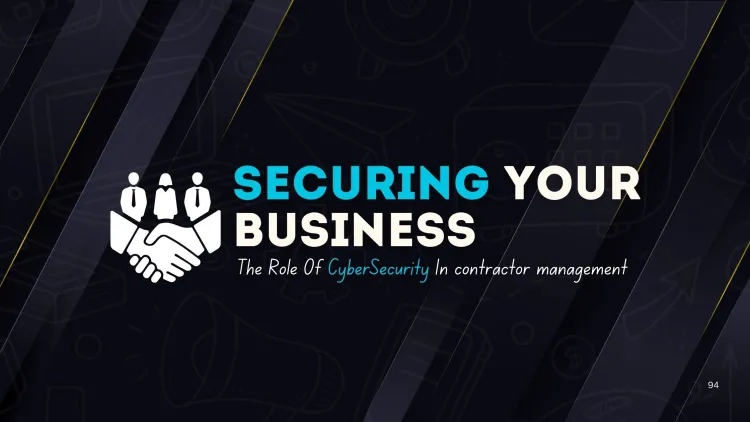Securing Your Business | The Role of Cybersecurity in Contractor Management
Cybersecurity is essential in contractor management to protect sensitive data and systems. Contractors often have access to business networks and information, posing risks such as unsecured devices, weak passwords, and accidental data leaks. To address these concerns, businesses should implement contractor management software that offers centralized control, tracks activities, and enforces security protocols. Additionally, clear cybersecurity policies and regular training for contractors can further strengthen security. By limiting data access, ensuring proper device usage, and promoting awareness, businesses can safeguard their operations and protect their reputation from cyber threats.

In today’s digital age, cybersecurity is a critical component for every business. With cyberattacks occurring at an alarming rate—around 30,000 daily—companies must ensure that their systems, networks, and data are well-protected. When businesses collaborate with contractors, the risk to security can increase, as contractors often require access to sensitive company information and systems. Therefore, integrating robust cybersecurity practices into contractor management is more important than ever.
In this blog, we will explore why cybersecurity is essential in contractor management and how businesses can protect themselves through strategic measures, including the use of high-quality contractor management software. Let’s dive into it.
The Growing Importance of Contractor Cybersecurity
Contractors are a crucial part of many businesses, providing specialized services for specific projects or tasks. However, granting contractors access to your company’s networks and sensitive information can open the door to security vulnerabilities. Unlike full-time employees, contractors may not always follow the same security protocols, which can create weak points in a company's defense system.
Common Cybersecurity Risks Posed by Contractors
-
Unsecured Devices: Contractors often use personal devices, which may not have the same security measures in place as company-issued devices. This can increase the risk of malware and unauthorized access to systems.
-
Weak Passwords: If contractors are not required to follow strong password policies, they may use easily guessable passwords that hackers can exploit.
-
Lack of Security Awareness: Contractors might not be as familiar with the company’s cybersecurity policies and could unknowingly expose the business to risks, such as falling for phishing scams or mishandling sensitive data.
-
Data Leaks: Contractors working for multiple companies might inadvertently share confidential information across organizations, leading to data leaks.
With so many daily cyberattacks, businesses must ensure that anyone with access to their systems, including contractors, follows strict security protocols to prevent data breaches and cyber incidents.
How Contractor Management Software Enhances Cybersecurity
One of the best ways to improve cybersecurity when working with contractors is to use contractor management software. This software offers businesses centralized control and oversight of contractor activities, which helps enforce security measures and ensures compliance with company policies.
Key Benefits of Contractor Management Software
-
Access Control: Contractor management software allows businesses to set precise access controls based on the role and responsibility of each contractor. For example, contractors only receive access to the specific data they need to perform their job—nothing more, nothing less.
-
Authentication Protocols: Businesses can require contractors to use multi-factor authentication (MFA) before accessing any sensitive systems. This adds an extra layer of security, making it harder for hackers to gain unauthorized access.
-
Tracking Contractor Activities: With contractor management software, businesses can monitor contractor activity in real-time. This makes it easier to detect suspicious behavior and act quickly to prevent any potential threats.
-
Automatic Revocation of Access: When a contractor’s project is complete or their engagement ends, the software can automatically revoke their access to the company's systems. This minimizes the risk of continued access to sensitive data after the contractor is no longer involved with the business.
By implementing contractor management software, businesses can significantly reduce the risk of cyber threats associated with contractors and maintain a secure working environment.
Developing Cybersecurity Policies for Contractors
In addition to using software, businesses must establish clear cybersecurity policies for contractors. These policies should define the security expectations for contractors and be included in their contractual agreements. This ensures that contractors understand their responsibilities when it comes to protecting the company’s data and systems.
Key Components of Cybersecurity Policies for Contractors
-
Limiting Data Access: Contractors should only have access to the data and systems necessary for their specific tasks. For example, a contractor working on a marketing campaign doesn’t need access to sensitive financial records. By limiting access to only relevant data, businesses reduce the potential for unauthorized exposure.
-
Device Usage: Contractors should use company-issued devices or, at the very least, devices that meet the company’s security standards. This minimizes the risk of personal devices with weak security measures being used to access sensitive information.
-
Password Policies: Contractors must adhere to the company’s password policies. This could include using complex passwords, changing them regularly, and avoiding the reuse of passwords across different platforms.
-
Incident Reporting: Contractors should be required to promptly report any security incidents, such as data breaches, lost or stolen devices, or suspicious emails. This ensures that any potential risks are addressed before they can cause significant harm.
By implementing these cybersecurity policies, businesses can ensure that contractors follow the same security practices as full-time employees, reducing the chances of a security breach.
Training and Awareness for Contractors
One of the most effective ways to protect your business is by providing regular cybersecurity training for contractors. Many contractors may not have the same level of awareness or training as in-house employees, which could lead to accidental security lapses.
Key Areas for Cybersecurity Training
-
Phishing and Social Engineering: Contractors should be taught how to recognize phishing emails and other social engineering tactics used by cybercriminals to trick individuals into revealing sensitive information.
-
Safe Internet Practices: Contractors should learn how to browse the internet securely, avoid visiting suspicious websites, and understand the risks associated with unsecured Wi-Fi networks.
-
Data Protection: Contractors must be educated on how to handle sensitive information securely, including how to store, transfer, and dispose of confidential data.
Investing in training not only ensures compliance but also reduces the likelihood of contractors unknowingly putting the business at risk. Well-trained contractors can better identify and avoid potential threats, making them an important part of the company’s overall cybersecurity strategy.
Bottom Line: Protecting Your Business and Reputation
In today’s increasingly connected world, contractors play an essential role in many businesses. However, allowing external contractors access to sensitive company data and systems requires careful consideration of cybersecurity risks. By using contractor management software, developing clear cybersecurity policies, and providing regular training, businesses can mitigate these risks and protect both their reputation and their customers’ data.
In conclusion, cybersecurity should be a top priority when working with contractors. Establishing a secure and transparent partnership is crucial for the long-term success of any business, and by implementing the right cybersecurity measures, businesses can safeguard their sensitive information from potential threats.
FAQ:
-
Why is cybersecurity important when working with contractors? Cybersecurity is crucial when working with contractors because they often have access to sensitive business systems and data. Without proper security measures, contractors can inadvertently expose the company to cyber threats.
-
What risks do contractors pose to cybersecurity? Contractors may use unsecured devices, weak passwords, lack security awareness, and unintentionally leak sensitive data. These risks increase if contractors don’t follow the same security protocols as full-time employees.
-
How can contractor management software improve cybersecurity? Contractor management software provides centralized control over contractor activities, tracks access to sensitive data, and ensures compliance with security protocols, minimizing risks and vulnerabilities.
-
What are the key features of contractor management software? Key features include access control, multi-factor authentication, real-time activity monitoring, and automatic revocation of access once a contractor’s engagement ends.
-
How can I limit contractor access to sensitive data? Limiting data access is vital. Contractors should only be granted access to the data and systems necessary for their specific tasks, reducing the risk of unauthorized exposure.
-
What should be included in cybersecurity policies for contractors? Policies should include data access limitations, guidelines for device usage, password policies, and incident reporting procedures. Contractors should understand their responsibility to follow these rules.
-
What kind of training should contractors receive regarding cybersecurity? Contractors should be trained in recognizing phishing scams, using the internet securely, and handling sensitive information properly. Regular training helps reduce the risk of security lapses.
-
How can contractor management software ensure compliance? Software ensures compliance by setting specific security protocols and monitoring contractor activities to detect suspicious behavior, ensuring that all contractors follow company policies.
-
What are the risks of contractors using personal devices for work? Personal devices often lack the necessary security measures, making them vulnerable to malware, unauthorized access, and data breaches. Businesses should ensure contractors use secure, company-approved devices.
-
What steps can businesses take to prevent data leaks by contractors? Businesses can implement strict data access controls, educate contractors on the risks of sharing information across organizations, and enforce policies that limit data exposure to the minimum required for job tasks.











![Top 10 Ethical Hackers in the World [2025]](https://www.webasha.com/blog/uploads/images/202408/image_100x75_66c2f983c207b.webp)



![[2025] Top 100+ VAPT Interview Questions and Answers](https://www.webasha.com/blog/uploads/images/image_100x75_6512b1e4b64f7.jpg)







